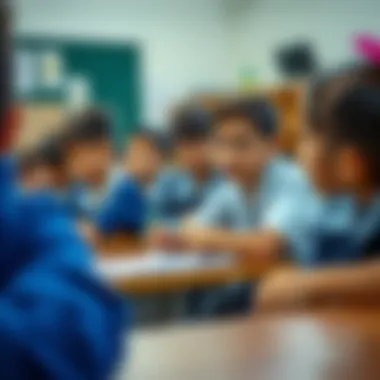Top Schools in Dubai: Insights from KHDA Evaluations


Intro
When it comes to education in Dubai, the KHDA (Knowledge and Human Development Authority) plays a pivotal role in shaping the academic landscape. Understanding how these evaluations work is essential for parents, students, and educators. The insights gained from the KHDA's assessments shed light on the schools that excel in various criteria, paving a path for better educational experiences.
Evaluating schools is no small feat. It requires a thorough investigation into many factors, such as teaching quality, student outcomes, and curriculum robustness. Each year, the KHDA’s findings provide a compass for families navigating the complicated waters of the education system in this dynamic emirate.
In this article, we will explore key aspects of KHDA's evaluations, including:
- The criteria used for assessments
- The diverse educational frameworks adopted
- Insights into how these rankings impact parental decisions
- The evolving trends within Dubai's schooling landscape
- Possible future directions of the educational sector
By delving into these points, we aim to offer a comprehensive understanding not only of which schools have made the grade but also of the nuances of educational evaluation in Dubai. Let’s dive deeper into the implications of these assessments and see how they shape the choices that families make.
Preface to KHDA
The Knowledge and Human Development Authority (KHDA) plays a pivotal role in shaping the educational landscape of Dubai. Established to oversee the private education sector, KHDA's work extends beyond mere administration; it sets the standards and expectations that schools must meet to provide a quality education. In this article, we will examine how KHDA assesses schools and what this means for local families, expats, and the broader community.
Role of KHDA in Dubai's Education System
The KHDA functions as the regulatory body for all private educational institutions in Dubai. It collaborates with schools to foster educational excellence, supporting initiatives that promote innovation, quality learning, and benchmarks for student attainment. KHDA's influence stretches across diverse sectors, impacting not just academic performance but also shaping the social and cultural fabric of the emirate.
By maintaining high standards, the KHDA ensures that schools are not just competing for academic excellence but are also nurturing the values and skills that students will need in a rapidly changing world. Families considering schools for their children often look at KHDA's ratings as a guiding light. A well-rated school in Dubai is more than an institution; it’s a community, a place where students flourish and parents feel assured about their child’s future.
Overview of KHDA's Evaluation Process
KHDA employs a systematic and rigorous evaluation process to assess schools across various criteria. It begins with the collection of data through inspections, which involves on-site evaluations and feedback gathering from students, teachers, and parents. Evaluators scrutinize several key areas, including:
- Academic Performance: Focusing on exam results and learning outcomes.
- Teaching Methodologies: How well teachers engage and support students.
- Student Wellbeing: Assessing safety, inclusiveness, and mental health initiatives.
- Leadership and Management: Evaluating the vision and effectiveness of school leadership.
This thoroughness ensures that KHDA's ratings reflect a comprehensive view of the institution's capabilities and potential. The evaluations are not just about checking boxes; they provide vital insights that can drive improvements in teaching and learning approaches. The ultimate goal is to create educational institutions that prepare students effectively for their futures.
As schools strive to align with KHDA’s standards, they also embrace an ethos of continuous improvement. This evaluation process encourages schools to innovate and adapt, ensuring students receive a rounded education that encompasses academics, extracurricular activities, and community involvement. With each assessment cycle, KHDA aims to refine and enhance the standards, making Dubai’s educational landscape remain competitive and dynamic.
"The KHDA is setting the groundwork for a robust educational future in Dubai, ensuring that schools are not just places of learning, but thriving educational ecosystems."
Understanding the Best Schools Criteria
Determining the quality of schools in Dubai isn’t just about shiny buildings or lofty promises. It's about understanding a complex landscape defined by robust metrics and cultural dynamics. Recognizing the best schools necessitates an examination of criteria that weighs heavily on both academic success and the overall well-being of students. This section delves into critical considerations that shape not only educational outcomes but also parental choices.
Academic Performance Metrics
Academic performance is at the heart of any school evaluation. It involves more than just test scores; it looks at a variety of indicators that signal how effectively a school is nurturing its students. For instance, schools typically provide data on standardized test performance, graduation rates, and university admission statistics. When parents sift through this information, they’re keen to find schools that consistently meet or exceed expectations.
However, one has to be careful here. Metrics can be inflated or presented in a way that doesn’t give a full picture. A school might boost its reputation with impressive grades but lack in providing a holistic education. Thus, discerning parents often seek out additional information, such as feedback from other parents or student testimonials, to get a sense of the school’s true performance.
- Key indicators to consider include:
- Average student test scores
- Teacher-to-student ratios
- Historical data on academic achievements
People often say, "knowledge is power," and in this context, knowing the ins and outs of academic performance metrics is crucial for making informed decisions about your child's education.
Student Wellbeing and Support Systems


A school that focuses solely on numbers misses a vital piece—student well-being. A supportive environment can greatly influence a student’s ability to learn effectively. This includes mental health resources, counseling services, and even extracurricular activities that foster personal development. In an age where stress and anxiety among young learners is rampant, schools must prioritize creating spaces where children can thrive emotionally as well as intellectually.
Supporting student well-being often translates into lower dropout rates and higher engagement levels. Some schools go above and beyond, implementing programs that teach resilience and emotional intelligence alongside traditional subjects. This holistic approach garners a lot of attention from parents who value a nurturing educational atmosphere.
- Supporting factors may include:
- Availability of counseling services
- Focus on social-emotional learning
- Extracurricular offerings that encourage teamwork and creativity
Parental Involvement and Community Engagement
The role of parents in a child's education cannot be overstated. Schools that actively encourage parental involvement often cultivate more vibrant educational communities. This can include regular communication between teachers and parents, involvement in school boards, or programs designed to engage families in school activities.
Community engagement is often the glue that holds a school together. It fosters a sense of belonging, not just for students but also for parents who wish to be part of their child’s educational journey. Schools that integrate local culture and traditions into their educational framework usually have a stronger connection with their community, leading to a more cohesive learning environment.
- Ways schools engage parents include:
- Open house or parent-teacher meetings
- Workshops and seminars for parents
- Programs encouraging parent participation in school events
In summation, understanding the criteria for determining the best schools in Dubai involves a multi-faceted approach. Academic performance, student well-being, and community engagement all play integral roles in shaping educational experiences. As parents navigate this complex landscape, it's essential to prioritize considerations that align with their child’s unique needs and aspirations.
Top-Ranked Schools in Dubai
In the diverse educational market of Dubai, identifying the top-ranked schools emerges as a critical endeavor for parents and stakeholders alike. The importance of these institutions extends beyond mere rankings; they represent quality education, cultural integration, and future opportunities for students. Parents, especially expatriates unfamiliar with the local landscape, find assurance in these rankings as they navigate choices while also considering their children's well-being and academic futures.
International Schools
Features of Leading International Institutions
The leading international schools in Dubai are renowned for their holistic approach to education, emphasizing not just academic excellence but also personal growth. A key characteristic of these institutions is their diverse student body. This multicultural environment cultivates an atmosphere of inclusivity and global awareness. For instance, schools such as the American School of Dubai and the British International School adopt frameworks that align closely with their home country's educational practices, creating a familiar yet challenging atmosphere for expatriate students.
These features contribute significantly to why parents favor international schools: they provide students with the necessary skills to thrive in an ever-globalizing world. One unique aspect is their focus on extracurricular activities, which not only enhance leadership qualities but also foster team spirit among students. However, it's vital to note that the high tuition fees can be a con for some families, making it essential to weigh the return on investment in education.
Comparison Among International Curricula
Examining the various curricula offered reveals substantial differences that influence parents' decisions. International Baccalaureate (IB), British, and American streams are some of the prominent educational paths available. A significant characteristic of these curricula is their emphasis on critical thinking and analytical skills, preparing students for the rigors of university life.
For example, IB schools, such as the Dubai International Academy, focus on a broader educational experience that promotes intercultural understanding. This and similar approaches can be appealing. But the unique challenge lies in the varied recognition of these qualifications by universities around the globe, which can affect students' future prospects. Parents must thus navigate these nuances to ensure that their children receive an education that meets their long-term goals.
Local Schools
Prominent Local Educational Systems
Local schools in Dubai offer a distinct value proposition that resonates with families seeking an education deeply rooted in Emirati culture. The prominent educational systems, such as the UAE Ministry of Education schools, focus on blending traditional values with modern pedagogical practices. A standout feature of these schools is their commitment to Arabic language and Islamic studies, fostering a deeper connection with the local heritage.
This approach is particularly beneficial for expatriate families that wish their children to grasp the cultural context of their host country. However, local schools sometimes face criticism for larger class sizes and a more rigid curriculum that may not cater to diverse learning styles.
Benefits of Cultural Context in Education
One major advantage of enrolling in local schools is the exposure to the cultural dynamics of UAE society, which can enrich a student's educational experience. The integration of local traditions within the curriculum helps students appreciate Emirati culture, while also reinforcing their identity. This culturally infused education can foster stronger community bonds among students and their families.
However, one challenge is that international students might initially struggle with language barriers. While learning Arabic can be an asset, it’s crucial for parents to be aware of this potential hurdle, balancing their child's comfort in a familiar language with the benefits of an immersive local experience.


Specialized Institutions
Focus on Arts and Sciences
Specialized institutions for arts and sciences have carved a niche in Dubai’s educational landscape. Schools like the Dubai College of Arts promote creativity and critical thinking, encouraging students to explore their passions while receiving a well-rounded education. These institutions often emphasize unique programs tailored to specific interests, whether in performing arts or advanced science courses.
Such specialization nurtures talent and fosters a generation of future leaders well-equipped to tackle contemporary problems. However, these specialized paths can sometimes lead to a narrower focus, which may not suit every student’s needs, especially those who prefer a broad-based educational background.
Vocational Training Opportunities
In response to the growing demand for skilled labor within the UAE, vocational training institutions have emerged. Schools such as the Dubai Institute of Design and Innovation (DIDI) offer programs specifically aimed at creating a workforce that is industry-ready. This characteristic is particularly appealing for students who may feel that traditional academic paths do not align with their career aspirations.
These vocational opportunities can provide students with hands-on experience and relevant industry connections. Nonetheless, the exclusivity of such programs may limit access for some and necessitate careful consideration of student interests and job market trends. Parents must evaluate these vocational options against other educational paths to determine the best fit for their children's future.
Parental Advantages and Choices
In the bustling educational landscape of Dubai, parents find themselves at a unique crossroads, trying to navigate the myriad options available for their children’s learning. The choices made can have lasting implications, shaping not only a child's educational trajectory but also their personal development. Understanding the advantages these choices bring is crucial for making informed decisions. It's not simply about picking a school; it's about selecting a partner in your child's education, a consideration that impacts family dynamics, location, and long-term goals.
Financial Implications for Families
When parents assess schools, financial aspects often serve as a considerable factor. The fees for international or top-tier local schools can range significantly. Parents might pay anywhere from 20,000 to 100,000 AED per year, depending on the institution. This cost can be daunting, yet it also includes diverse amenities like extracurricular programs, advanced technology, and exceptional faculty.
Furthermore, understanding the concept of return on investment is essential. Parents should consider:
- Quality of Education: Higher fees can correlate with better resources, experienced teachers, and improved educational outcomes.
- Scholarship Opportunities: Many schools offer financial assistance which can alleviate some of the burdens.
- Long-Term Benefits: Investing in education can lead to higher university placement, scholarship opportunities, and superior career prospects for children later on.
Parents ought to weigh these factors against their family budget, evaluating whether the financial commitment aligns with their expectations and values.
Diverse Educational Offerings
One of the most striking features of Dubai's educational environment is its variety. Schools offer a plethora of curricula, from British and American to International Baccalaureate and Indian systems. This diversity ensures that parents can find a school that aligns with their child's learning style and aspirations.
- Curriculum Fit: Each educational framework offers different methodologies and focuses. For instance, the British curriculum emphasizes critical thinking and examination preparation, while the American system might focus more on holistic development.
- Extracurricular Activities: Schools here also emphasize a rounded education that includes sports, arts, and other creative pursuits. Notable institutions frequently offer a variety of clubs and activities that encourage personal growth alongside academic achievement.
- Cultural Exposure: Exposure to different cultures enriches students' educational experiences, fostering a global mindset. This exposure is vital in a city where expatriate communities thrive and students interact with peers from various backgrounds.
Taking the time to explore these diverse educational offerings can help families find a well-rounded educational fit, enhancing not only academic success but also personal development.
"The right school can unlock hidden potentials in children, guiding them to reach their dreams while still ensuring families feel secure in their decisions."
The Role of Cultural Dynamics in Education
Understanding cultural dynamics is essential in the context of education, especially in a diverse city like Dubai. The role of these dynamics can’t be overstated; they shape the entire educational landscape, influencing everything from teaching methodologies to student engagement, and parental involvement. As families hailing from various corners of the globe settle in Dubai, their distinct backgrounds bring a rich tapestry of traditions, languages, and educational philosophies. This mixture encourages schools to adopt a more inclusive approach, creating a learning environment that fosters not only academic excellence but also respect and appreciation for cultural diversity.
Integrating cultural elements into education provides several benefits. First, it promotes critical thinking, as students encounter diverse views and practices, urging them to question, analyze, and understand different perspectives. Second, this integration cultivates an environment of empathy and collaboration, essential skills in today’s globalized world. Finally, schools that embrace cultural dynamics can attract a broader base of parents and students, which can enhance their reputation and financial viability.
Influence of Expatriate Communities
Expats make up a sizable portion of Dubai's population, and their influence on the educational system is profound. These communities often seek schools that cater to their specific needs, leading to the establishment of various international schools that offer curricula aligned with American, British, and other systems. Their presence encourages educational institutions to innovate and adapt, ensuring the offerings resonate with a global audience.
When families from diverse national borders come together, they often share their values and educational preferences. Schools in Dubai thus find themselves in a position to cultivate a multicultural learning environment that reflects the diversity of its student body. This exposure not only enhances academic discussions but also prepares students for diverse work settings later in life.
"The educational setting in Dubai serves as a microcosm of the world, with expat communities bringing varied perspectives that enrich the learning experience for everyone."


Integration of Local Traditions and Values
While the international nature of Dubai's schools is prominent, the integration of local Emirati traditions and values is equally important. Schools often incorporate aspects of local culture into their curriculum, providing students with a holistic understanding of the land in which they live. This blend of local and international elements not only respects the heritage of the UAE but also enriches the educational experience.
Teaching students about Emirati values—such as respect, hospitality, and community—helps them appreciate the cultural context of their education. By learning about local history, geography, and societal norms, students cultivate a deeper connection to the country, enhancing their experience and integration into society.
Future Trends in Dubai's Education System
As the educational landscape in Dubai continues to evolve, understanding future trends is crucial for stakeholders such as parents and investors. The city is not only a hub of diverse cultural influences but also a beacon for innovation. The drive towards modernizing education involves keeping pace with technological advancements, adapting to global trends, and redefining educational priorities to create well-rounded individuals.
Technological Advancements in Schools
The integration of technology in education is no longer a luxury but a necessity. Schools in Dubai are steadily adopting cutting-edge solutions to enhance learning experiences. Emerging technologies like virtual reality (VR) and artificial intelligence (AI) are being experimented with in classrooms, providing interactive and enriched educational environments.
For instance, schools like GEMS World Academy have implemented AI tools that cater to personalized learning. They assess students’ progress and tailor educational paths based on results. This adaptability creates a space where students can flourish at their own pace.
Moreover, embracing online platforms for learning, especially post-pandemic, has become integral. Students have access to a wealth of resources online, breaking down geographical barriers that once limited education to a physical classroom. It's crucial for both educators and parents to grasp how these advancements shape curriculum delivery and significant performance metrics.
Impact of Global Education Trends
The influence of global education trends extends far beyond conventional learning methods. In Dubai, educational institutions are increasingly aligning curricula with international standards. The adoption of systems like the International Baccalaureate (IB) reflects a shift towards global competency, focusing not just on rote learning but also on critical thinking skills.
"Education must not only prepare the youth for exams but also equip them to tackle real-world challenges."
Many schools, including international ones like British International School, have reimagined their offerings to include more global perspectives. This shift attracts expatriate families who seek a more interconnected educational environment for their children, fostering a sense of global citizenship among students. Furthermore, this aligns with parent expectations for their children to have qualifications that are recognized and valued internationally, thus enhancing the overall appeal of Dubai's educational institutions.
Shift Towards Holistic Education Models
Another significant trend observed in Dubai is the shift towards holistic education models. This approach focuses on nurturing not only academic skills but also social, emotional, and physical development. Schools are now prioritizing student wellbeing, embedding mental health programs into their curricula, and creating environments that promote resilience and emotional intelligence.
Institutions like Dubai American Academy emphasize character building alongside academics, ensuring that students graduate not just with knowledge but also as responsible global citizens. This holistic approach resonates well with expatriates who are increasingly aware of the importance of raising well-balanced children in a fast-paced, competitive world.
The importance of sports, arts, and community service has also gained recognition as essential components of a comprehensive education, appealing to parents looking for well-rounded educational experiences.
By considering these trends, families can make informed decisions about their children's futures, paving the way for success in an ever-evolving global landscape.
Culmination
The examination of the KHDA's best schools in Dubai holds significant weight for a variety of stakeholders, particularly for parents and potential investors in the education sector. Understanding the factors that contribute to schools receiving top rankings enables families to make informed choices, ensuring their children receive quality education tailored to current global standards. Similarly, for investors and developers, having insights into these educational centers can guide decisions regarding property investments, as proximity to reputable schools can elevate property values and attract expat families.
Summary of Insights on Best Schools
In dissecting the nuances surrounding the best schools as rated by KHDA, key observations emerge. Firstly, the academic performance metrics consistently establish a sturdy benchmark against which educational institutions can be measured. Schools like Dubai College and GEMS World Academy shine not only for their impressive exam results but also for their commitment to fostering a balanced educational environment.
Moreover, student wellbeing and support systems have become central to the assessment process. Institutions such as Repton School provide personalized mentoring, creating an atmosphere conducive to both learning and emotional growth. This holistic approach is gradually redefining success beyond traditional academic accolades.
Lastly, the involvement of parents significantly impacts school rating outcomes, with many top-tier schools actively promoting community engagement. Schools that successfully integrate parental involvement into their frameworks often nurture an environment that benefits students tremendously, highlighting the importance of collaborative learning experiences.
Final Thoughts on Future of Education in Dubai
As we gaze into the crystal ball of education in Dubai, a few trends are unmistakably on the rise. The integration of technological advancements into the curriculum is no longer an optional add-on but a foundational element that shapes teaching and learning methodologies. Schools are beginning to leverage tools like iPads and interactive online platforms to create immersive educational experiences.
Moreover, as global education trends evolve, schools in Dubai are adapting to incorporate international best practices while catering to local needs. This dual focus not only enhances the educational framework but also promotes cultural appreciation among a diverse student body.
With an ongoing shift toward holistic education models, there’s palpable optimism that Dubai can position itself as an educational hub, offering a blend of academic rigor and personal development. This evolution not only encapsulates the essence of what it means to educate in the twenty-first century but also provides a framework for future growth and improvement.
"Quality education is one of the most potent tools for shaping the future."
For anyone looking to delve deeper into the subject, resources like the KHDA official website (khda.gov.ae) and education-focused forums on platforms like Reddit (reddit.com/r/education) can provide valuable additional information.



